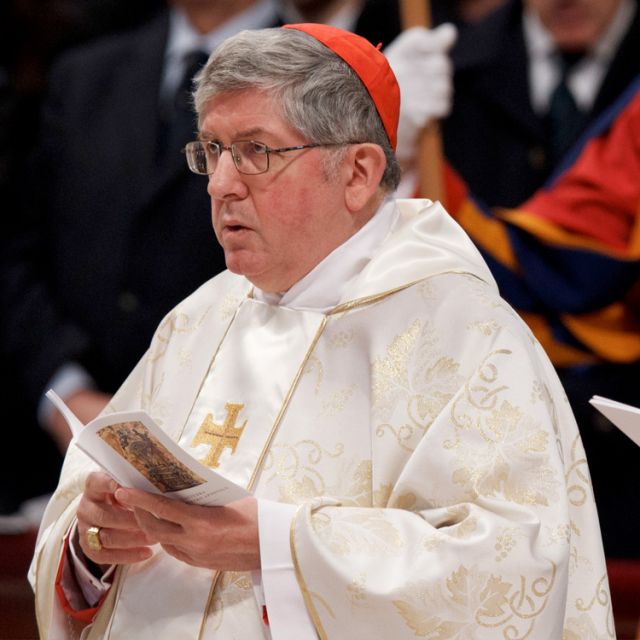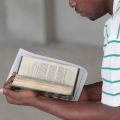Church leaders called to preserve tradition, Pope tells new cardinals
VATICAN CITY - Leaders and members of the Catholic Church do not have the authority to determine its teaching and structure but are called to ensure its fidelity to Jesus and to the faith passed on by the apostles, Pope Benedict XVI told the 22 new cardinals he created.
"The Church is not self-regulating, she does not determine her own structure, but receives it from the Word of God, to which she listens in faith as she seeks to understand it and to live it," the Pope said in a homily Feb. 19 during a Mass concelebrated with the new cardinals in St. Peter's Basilica.
Pope, new cardinals concelebrate Mass
VATICAN CITY — Pope Benedict XVI and the 22 new cardinals he created yesterday concelebrated Mass this morning in St. Peter’s Basilica.
The pope used Bernini’s sculpture of the Chair of St. Peter to illustrate his homily since the Mass marked the feast of the Chair of St. Peter, a liturgical solemnity that highlights Jesus giving Peter the authority to lead the church in love. The statue is topped by a window with a stained-glass dove representing the Holy Spirit.
Cold feet, warm hugs: Pilgrims do what it takes to see new cardinals
VATICAN CITY - More than 10,000 friends, family and supporters bore chilly morning temperatures, pressing crowds and long lines to get a chance to see Pope Benedict XVI place a red hat on their favorite cardinal. Only a few thousands got to see it happen in person.
“We arrived at the main gate at 6 a.m. just like good little pilgrims, in the freezing cold,” said Annette Zaralli Parsons from Richmond, Va.
But then they opened a different gate to let people into St. Peter’s Basilica for the Feb. 18 consistory to create 22 new cardinals from 13 countries “and so the people who had gotten in line later got in. So you should make your headline read: ‘Pilgrims freeze, miss consistory,’” she told Catholic News Service.
Pope creates 22 new cardinals, calls them to love, service
VATICAN CITY - Pope Benedict XVI created 22 new cardinals from 13 countries -- including three from the United States and Canada -- placing red hats on their heads and calling them to lives of even greater love and service to the church.
The churchmen who joined the College of Cardinals Feb. 18 included Cardinals Timothy M. Dolan of New York; Edwin F. O'Brien, grand master of the Equestrian Order of the Holy Sepulcher of Jerusalem and former archbishop of Baltimore; and Thomas C. Collins of Toronto.
Of cardinal importance: new princes of the church on their role
VATICAN CITY - Practically everyone knows two things about cardinals -- that they wear red hats and elect the Pope. But what other purpose do these men serve in the Catholic Church?
On the eve of the Feb. 18 consistory where Pope Benedict XVI was scheduled to expand the College of Cardinals by 22 new members, the three North Americans among them shared some thoughts on the meaning of their new role.
Cardinal-designate Dolan leads cardinals' reflection on evangelization
VATICAN CITY - Secularism has had an easy time spreading through many traditionally Christian cultures because so many Christians do not know their faith and do not grasp the truth it teaches, Cardinal-designate Timothy M. Dolan of New York told the College of Cardinals.
While the New York prelate did not downplay the challenges the church faces in reviving the faith of its members and bringing the Gospel to those who have never heard it, he delivered his assessment Feb. 17 with his characteristic smile and broad gestures, telling Pope Benedict XVI and the cardinals that evangelization requires joy and love.
Pope says no future without children, urges support for large families
VATICAN CITY - Pope Benedict XVI called on governments and communities to help large families, saying children represent hope and the well-being of every nation.
"There is no future without children," he said at the end of his general audience Feb. 15 in a greeting to members of an Italian association of large families.
"In today's social context, a family made up of many children constitutes a witness of faith, courage and optimism," he said.
We can be instruments of God’s reign
First Sunday of Lent (Year B) Feb. 26 (Genesis 9:8-15; Psalm 25; 1 Peter 3:18-22; Mark 1:12-15)
What is the connection between a beautiful rainbow and the aftermath of a catastrophic flood? To our own minds, there is no connection at all. The flood is the result of natural forces — rain, wind and tides — and there is little or no meaning in it. A rainbow, as beautiful as it is, is caused by the sun being refracted through the moisture in the air. But if you are a person living in the ancient world, every manifestation of nature is the hand of God. Ancient people “connected dots” — event “B” occurred after event “A,” therefore “A” must have been the cause, with God as the ultimate connection between all events.
Other sheep not of our flock
I grew up with strong, conservative, Roman Catholic roots: the Baltimore Catechism, the Latin Mass, daily rosary, daily Mass if possible and a rich stream of devotional practices. And that’s a gift for which I’m deeply grateful.
But that wonderful grounding also brought with it a distrust of all religious things not Roman Catholic. I was taught that the Roman Catholic Church was the only true Church and the only road to heaven; so much so that we were strongly discouraged and tacitly forbidden to participate in any Protestant services. In fairness to that catechesis, we didn’t believe Protestants and other religious communities were doomed to eternal perdition, but we struggled mightily to articulate how this might take place. Among other things, we postulated a place we called Limbo, where sincere, non-Roman Catholics with good souls might spend eternity, happy but without God.
Pope: Vocations are born from openness to the love of God
VATICAN CITY - Love of God nurtures love of neighbor, especially in people with vocations to the priesthood or religious life, said Pope Benedict XVI in his message for the World Day of Prayer for Vocations.
The papal message for the 49th World Day of Prayer for Vocations, which will be observed April 29, was released Feb. 13 at the Vatican.
We need to re-sensitize ourselves to God’s compassion and mercy
Seventh Sunday in Ordinary Time (Year B) Feb. 19 (Isaiah 43:18-19, 20-22, 24-25; Psalm 41; 2 Corinthians 1:18-22; Mark 2:1-12)
Humanity has a huge memory problem. On the one hand, we are far too quick to forget things that should be the source of wisdom. It is very easy to sweep unpleasant or painful actions and events under the mental carpet and refuse to learn from our mistakes. On the other hand, often the problem is just the opposite: an overactive memory and a refusal to let go of the past. People (or groups) can cling to traumas and injustices and continually relive them. They can engage in a lot of inner self-flagellation and self-hatred.











